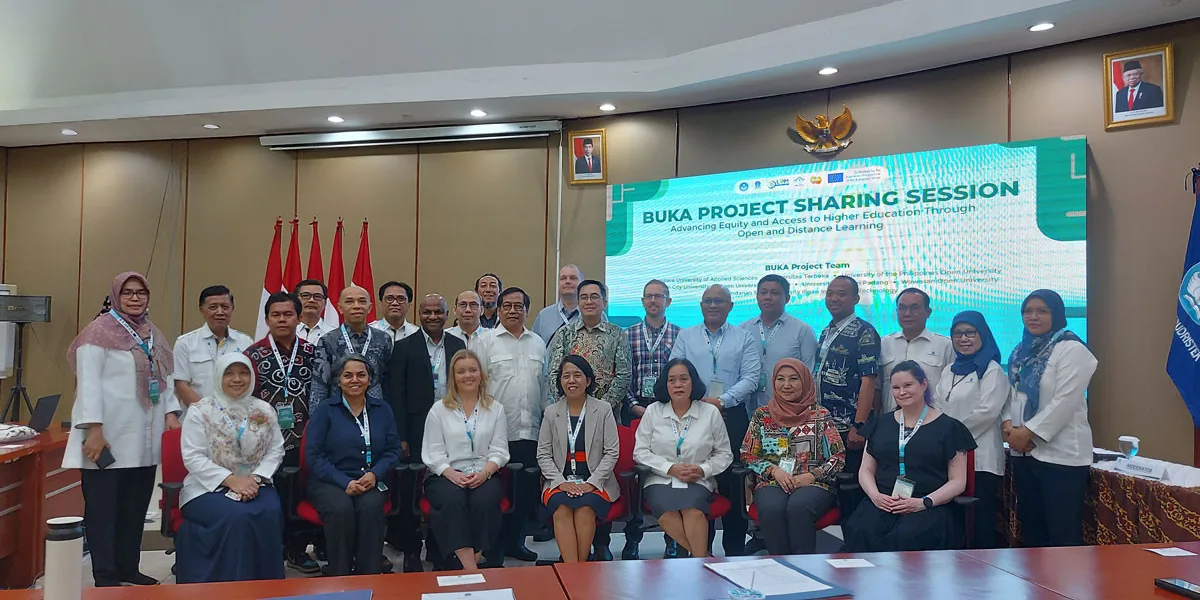Online learning has become an integral part of our daily lives after it became the main vehicle for education during the pandemic. However, it did not come without obstacles. Universitas Terbuka (UT) hosted a sharing session for the BUKA program, an acronym for Better University Knowledge for All, on Monday (12/06/2023).
The program is cofounded by the Erasmus Plus program of the European Union, is chaired by Tampere University of Applied Sciences (TAMK) Finland, and is expected to run for three years, from 2020 through 2023. It aims to improve equity of access and quality of higher education in Southeast Asia through open and distance learning, particularly in Indonesia, Malaysia and the Philippines, by using inclusive instructional design, learning analytics and digital access.
“Universities such as UT are in the most important position because we have come to realize that the expertise of [open and distance learning] providers are in greater demand than ever,” said Hanna Teras of TAMK. “We are finding ways to tackle these issues, and because each university is engaging in its own pilot project, we are learning more. I think the best result in the pilot project is working together, collaborating, learning together from one another.”
In addition to UT, the BUKA university partners include Dublin City University (DCU) Ireland, Open University Malaysia (OUM), Wawasan Open University (WOU) Malaysia, the University of the Philippines’ Open University (UPOU), Mindanao State University–Iligan Institute of Technology (MSU-IIT) the Philippines, and Padang State University (UNP) West Sumatra. It was attended by representatives from Indonesia, Malaysia and the Philippines, as well as delegates from DCU and TAMK.
The event was an opportunity for UT to showcase their UT Akses program, which was started in 2020 with the aim to improve educational conditions and access for all students across Indonesia, especially those in rural areas with little or no internet access.
UT Akses is a local hotspot network installed in five remote areas and UT students on the island of Java. The five regions are Cigombong, Jasinga, Serang, Tegal and Garut. Because of the pandemic and the geographical nature of the archipelago country, the program has not gone beyond Java. However, plans have been made to expand to other islands. The program serves as a pilot project for Indonesia, focusing on two objectives: to develop an inclusive learning design and to develop local cellular networks.
“The decision about Java is because of COVID-19. At that time, we were planning outside of Java, that was our priority. Because of COVID there were limitations to travel, so we focused on Java,” said Dr. Daryono, S.H., M.A., Ph.D., head of the Distant Education Research and Innovation Center (PRI-PTJJ LPPM) at UT. He revealed that even in the most populated island, there are many areas that lack the support they need for better education.
For the first objective, the project has developed two online student support services in the form of assignment workshops and examination clinics. Moreover, it has also increased academic staff capacity on the inclusive learning design in hopes to improve competent educators across Indonesia. For the second, in order to develop a local cellular network the program strives to provide access to UT Online for students living in remote areas, and empower IT staff skills on the development of a local hot spot infrastructure to ensure accessibility.
“As long as they provide the resources and the training and the space, if they allow a little bit of space for students and staff into that kind of way of learning, then I think they will succeed. If we want to allow the benefits that people saw from more flexibility [of online learning] during the pandemic, we maintain the good, but we have to add more good on top of that in terms of resources and training,” said James Brunton of DCU.
The sharing session on Monday was held to present research results submitted by representatives of each university partner in the context of disseminating research project results. This BUKA project meeting is regarded as the last meeting of the year, and is arguably the most poignant as it prepares for the BUKA Conference which will be held in Penang, Malaysia, this coming October, along with the presentation of the BUKA Handbook. Therefore, the purpose of this event is to check the progress of the BUKA project which focuses on Southeast Asia, finalize the BUKA Advising Handbook, and evaluate the EU and Erasmus Plus program.
“The handbook is going to be an edited book, with a creative common license, an e-book available for everyone. And our goal is to share the best practices and experiences that we have had in these projects for everyone to learn from it,” Hanna explained, adding that the book is expected to be out in September.
This article was published in thejakartapost.com with the title “BUKA program allows online learning to solve lack of quality in education”. Click to read: https://www.thejakartapost.com/front-row/2023/06/12/buka-program-allows-online-learning-to-solve-lack-of-quality-in-education.html.

